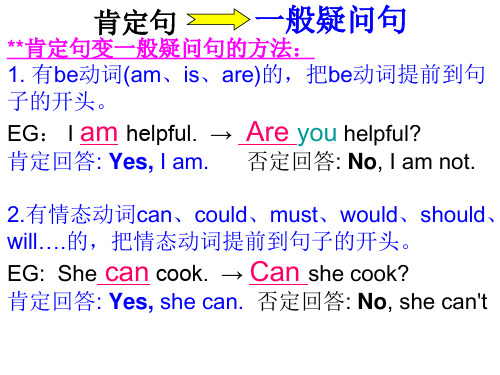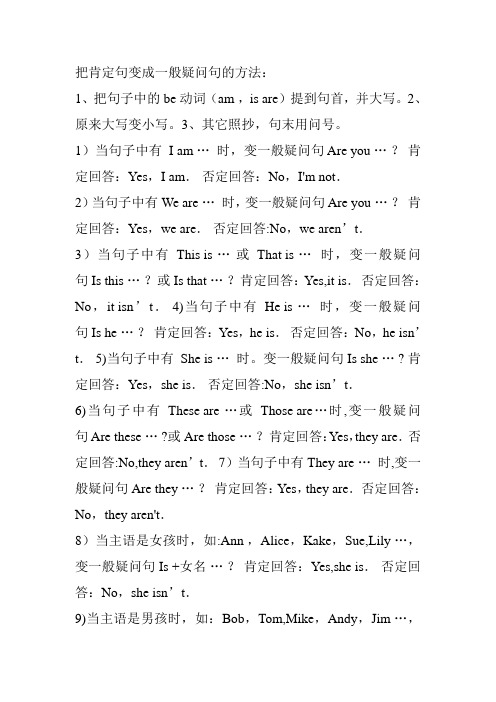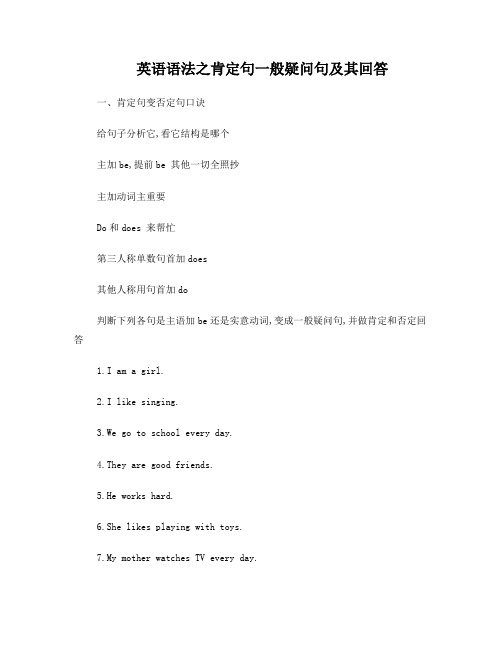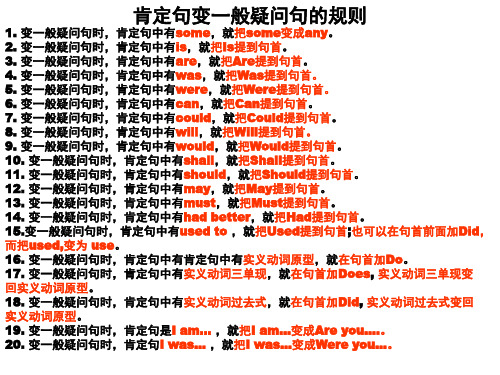肯定句变一般疑问句
肯定句变一般疑问句

肯定回答: Yes, she can. 否定回答: No, she can't
肯定句
一般疑问句
3.没有be动词,也没有情态动词的,则在句子开头
加助动词do或does。
* Do + (you / they / we…复数) + 动原
EG: I often read books.
肯定句
一般疑问句
**肯定句变一般疑问句的方法:
1. 有be动词(am、is、are)的,把be动词提前到句
子的开头。
EG: I am helpful. → Are you helpful?
肯定回答: Yes, I am. 否定回答: No, I am not.
2.有情态动词can、could、must、would、should、 will….的,把情态动词提前到句子的开头。
Yes, he does. No, he doesn't.
肯定句变一般疑问句
7. There are some apples on the tree.
Are there any apples on the tree?
Yes, there are. No, there aren't.
Yes, he should.
No, he shouldn't.
5. We often read books in the library.
Do you often read books in the library?
Yes, we do.
No, we don't.
6.Tom plays football every weekend. Does Tom often play football every weekend?
肯定句变成一般疑问句的方法

Heplayscomputergameseveryday.→Doesheplaycomputergameseveryday?
Weplayedcomputergamesyesterday.→Didyouplaycomputergamesyesterday?
如:
—AreyouanEnglishteacher?
→Yes,Iam./No,Iamnot.
—Isthatabird?
→Yes,itis./No,itisn’t.
肯定句变成一般疑问句相关练习
将下列句子改为一般疑问句,并作肯定和否定回答
1.Theyaresingingintheclassroom.
2.Mybrotherlikesgoingshoppingverymuch.
一般疑问句的回答
一般疑问句有两种回答,即:肯定回答和否定回答。
肯定回答用yes,语句顺序为:Yes,主语+am/is/are/was/were.|can.|do/does/did|;
否定回答用no,语句顺序为:
Non’t/wasn't/weren't.|can't.|don't/doesn't/didn't|.。
3.Therearesomeapplesandorangesinthebasket.
4.Thefoodcangiveusenergyforhavingsports.
5.I’dliketoeatsomehamburgers.
6.Iknowtheanswer.
7.Wecanseesomebirds.
把肯定句改成一般疑问句的方法

把肯定句变成一般疑问句的方法:1、把句子中的be动词(am ,is are)提到句首,并大写。
2、原来大写变小写。
3、其它照抄,句末用问号。
1)当句子中有I am …时,变一般疑问句 Are you …?肯定回答:Yes,I am.否定回答:No,I'm not.2)当句子中有We are …时,变一般疑问句 Are you …?肯定回答:Yes,we are.否定回答:No,we aren’t.3)当句子中有This is …或That is …时,变一般疑问句 Is this …?或Is that …?肯定回答:Yes,it is.否定回答:No,it isn’t. 4)当句子中有He is …时,变一般疑问句 Is he …?肯定回答:Yes,he is.否定回答:No,he isn’t. 5)当句子中有She is …时。
变一般疑问句 Is she … ? 肯定回答:Yes,she is.否定回答:No,she isn’t.6)当句子中有These are …或Those are…时,变一般疑问句 Are these … ?或Are those …?肯定回答:Yes,they are.否定回答:No,they aren’t. 7)当句子中有They are …时,变一般疑问句Are they …?肯定回答:Yes,they are.否定回答:No,they aren't.8)当主语是女孩时,如:Ann ,Alice,Kake,Sue,Lily …,变一般疑问句 Is +女名…?肯定回答:Yes,she is.否定回答:No,she isn’t.9)当主语是男孩时,如:Bob,Tom,Mike,Andy,Jim …,变一般疑问句 Is +男名…?肯定回答:Yes,he is.否定回答:No,he isn’t.10)当主语是指物的可数名词单数时,如book,pen,pencil,car,cat …变一般疑问句 Is +可数名词单数…?肯定回答:Yes,it is.否定回答:No,it isn’t.当主语是指物的可数名词复数时,如books,pens,pencils,cars,cats …变一般疑问句 Are +可数名词复数…?肯定回答:Yes,they are.否定回答:No,they aren't。
肯定句变成一般疑问句的方法

肯定句变成一般疑问句的方法第一步:看所给句子的谓语动词是否为Be动词,是Be动词的,把Be动词移放在句首,剩下的照抄,同时将句子中的some 改成any. I 改成you, my改成your, 句点改成问号。
如:I am a teacher. →Are you a teacher?She is a student. → Is she a student.第二步,看所给句子的谓语动词是否为情态动词,是情态动词的,把情态动词can,shall, will等移放到句首,剩下的照抄,同时将句子中的some 改成any.I 改成you, my改成your, 句点改成问号。
如:I can play basketball. → Can you play basketball?第三步,如果所给句子的谓语动词既不是Be动词也不是情态动词,在句首请助动词Do/Does/Did帮忙,剩下的照抄,同时将句子中的some 改成any. I 改成you, my改成your, 句点改成问号。
如:I play computer games everyday. →Do you play computer games everyday? He plays computer games everyday. →Does he play computer games everyday? We played computer games yesterday . →Did you play computer games yesterday?一般疑问句的回答一般疑问句有两种回答,即:肯定回答和否定回答。
肯定回答用yes, 语句顺序为:Yes ,主语 + am /is/ are/was/were.|can.|do/does/did|;否定回答用no,语句顺序为:No,主语+ am not/ isn’t/ aren’t/wasn't/weren't.|can't.|don't/doesn't/didn't|.。
英语语法之肯定句变一般疑问句

英语语法之肯定句一般疑问句及其回答一、肯定句变否定句口诀给句子分析它,看它结构是哪个主加be,提前be 其他一切全照抄主加动词主重要Do和does 来帮忙第三人称单数句首加does其他人称用句首加do判断下列各句是主语加be还是实意动词,变成一般疑问句,并做肯定和否定回答1.I am a girl.2.I like singing.3.We go to school every day.4.They are good friends.5.He works hard.6.She likes playing with toys.7.My mother watches TV every day.8.You are a beautiful girl.9.Tom is playing football on the playground.10.Bill does his homework after supper.三、肯定句一般疑问句规则肯定句主语+be+其他变成be+主语+其他主语+动词+其他变成Do+主语+动词+其他主语(第三人称单数)+动词单三+其他变成Does+主语(第三人称单数)+动词原形+其他练习:变成一般疑问句,并做肯定和否定回答1.She is watching TV now.2.We go to school on Sunday.3.His father works hard.4.Jack's mother is a nurse.5.The cat runs fast.6.They like reading books.7.My grandpa gives me a hot dog.8.Tom often walks to school.9.I have a doll.10.It is eating fish.一、按要求完成句子(要求:变成一般疑问句,并做肯定和否定回答1. I am a student.→2. They are English cars.、3. This is a pencil-box.4. Its name is Polly.5. Jim is at school.6. These are my English books.7. I know his name.。
肯定句变一般疑问句的注意点和规则

变为否定句
1. I am Maria’s friend. I _____ ______ Maria’s friend. am not 2. He was reading a novel in the study. wasn’t He ________ _________ a novel in the study. reading 3. Steve was doing some cleaning at this time yesterday. any Steve wasn’t doing ______ cleaningቤተ መጻሕፍቲ ባይዱat this time yesterday. ______ 4. He minds it. He doesn’t ______ it. _______ mind 5. Be quick. ______ be Don’t ______ quick. 6. Michael can speak some French.. Michael ______ speak ______ French. can’t any *7. I used to walk to school before. I _________ ______ walk to school before. usedn’t to
变为一般疑问句
1. I am from Canada. _____ _____ from Canada? Are you 2. She is looking for her dog. _____ she __________ for her dog? Is looking 3. They are some knives. ______ they ______ knives? Are any 4. There were some birds in the tree two days ago. ______ there ______ birds in the tree two days ago? Were any 5. I would like to go with you. ______ you ______ to go with me? Would like 6. Maria does sports every day. _____ Maria _____ sports every day? Does do *7. You’d better go home at once. _______ you _______ go home at once? better Had
把肯定句改成一般疑问句的方法
把肯定句变成一般疑问句的方法:1、把句子中的be动词(am,isare)提到句首,并大写。
2、原来大写变小写。
3、其它照抄,句末用问号。
1)当句子中有Iam…时,变一般疑问句Areyou…肯定回答:Yes,Iam.否定回答:No,I’mnot.2)当句子中有Weare…时,变一般疑问句Areyou…肯定回答:Yes,weare.否定回答:No,wearen’t.3)当句子中有Thisis…或Thatis…时,变一般疑问句Isthis…或Isthat…肯定回答:Yes,itis.否定回答:No,itisn’t.4)当句子中有Heis…时,变一般疑问句Ishe…肯定回答:Yes,heis.否定回答:No,heisn’t.5)当句子中有Sheis…时.变一般疑问句Isshe…肯定回答:Yes,sheis.否定回答:No,sheisn’t.6)当句子中有Theseare…或Thoseare…时,变一般疑问句Arethese…或Arethose…肯定回答:Yes,theyare.否定回答:No,theyaren’t.7)当句子中有Theyare…时,变一般疑问句Arethey…肯定回答:Yes,theyare.否定回答:No,theyaren’t.8)当主语是女孩时,如:Ann,Alice,Kake,Sue,Lily…,变一般疑问句Is+女名…肯定回答:Yes,sheis.否定回答:No,sheisn’t.9)当主语是男孩时,如:Bob,Tom,Mike,Andy,Jim…,变一般疑问句Is+男名…肯定回答:Yes,heis.否定回答:No,heisn’t.10)当主语是指物的可数名词单数时,如book,pen,pencil,car,cat…变一般疑问句Is+可数名词单数…肯定回答:Yes,itis.否定回答:No,itisn’t.当主语是指物的可数名词复数时,如books,pens,pencils,cars,cats…变一般疑问句Are+可数名词复数…肯定回答:Yes,theyare.否定回答:No,theyaren’t.11)当主语是AandB时(A和B指物或者人,如dagandcat;TomandBob),变一般疑问句Are+AandB…肯定回答:Yes,theyare.否定回答:No,theyaren’t.12)当主语是BandI时,变一般疑问句AreyouandB…肯定回答:Yes,weare.否定回答:No,wearen’t.13)Thereis…变一般疑问句Isthere…肯定回答:Yes,thereis.否定回答:No,thereisn’t.14)Thereare…变一般疑问句Arethere…肯定回答:Yes,thereare.否定回答:No,therearen’t.。
肯定句,否定句,一般疑问句
am,is, are,can后面加上not,其余按顺序照抄。
肯定句变一般疑问句:把am,is, are,can提前放到句首并大写Am, Is,Are,Can,其例1:1)I am a boy.否定句:I am not a boy 一般疑问句:Are you a boy?Yes, I am/ No,I am not.2)He is a student。
否定句:He is not a student. 一般疑问句:Is he a student?3)There are many apples on the tree.否定句:There are not many apples on the tree。
一般疑问句:Are there many apples on the tree?4)They can swim。
否定句:They can not swim。
疑问句:Can they swim?do not或者does not,动词改原型,其余按顺序照抄.肯定句变一般疑问句:在句首加do或者does并大写,动词改原型,其余照抄。
例21)He goes to school. 否定句:He does not go to school。
疑问句:Does he go to school?2)They like eating apples. 否定句:They do not like eating apples. 疑问句:Do they like eating apples?练习:一。
将下列句子变成否定句、一般疑问句1 Mr Wang is thirsty。
否定句:__________________________一般疑问句: _______________________? 肯定回答:___________ 否定回答___________ 2。
The elephant’s ears are long.否定句:__________________________一般疑问句: _______________________? 肯定回答:___________ 否定回答___________ 3。
英语语法之肯定句变一般疑问句
英语语法之肯定句一般疑问句及其回答一、肯定句变否定句口诀给句子分析它,看它结构是哪个主加be,提前be 其他一切全照抄主加动词主重要Do和does 来帮忙第三人称单数句首加does其他人称用句首加do判断下列各句是主语加be还是实意动词,变成一般疑问句,并做肯定和否定回答1.I am a girl.2.I like singing.3.We go to school every day.4.They are good friends.5.He works hard.6.She likes playing with toys.7.My mother watches TV every day.8.You are a beautiful girl.9.Tom is playing football on the playground.10.Bill does his homework after supper.三、肯定句一般疑问句规则肯定句主语+be+其他变成be+主语+其他主语+动词+其他变成Do+主语+动词+其他主语(第三人称单数)+动词单三+其他变成Does+主语(第三人称单数)+动词原形+其他练习:变成一般疑问句,并做肯定和否定回答1.She is watching TV now.2.We go to school on Sunday.3.His father works hard.4.Jack's mother is a nurse.5.The cat runs fast.6.They like reading books.7.My grandpa gives me a hot dog.8.Tom often walks to school.9.I have a doll.10.It is eating fish.一、按要求完成句子(要求:变成一般疑问句,并做肯定和否定回答1. I am a student.→2. They are English cars.、3. This is a pencil-box.4. Its name is Polly.5. Jim is at school.6. These are my English books.7. I know his name.。
肯定句变一般疑问句的口诀
肯定句变一般疑问句的口诀
肯定句变一般疑问句的口诀如下:
反问词提前对句子换,
助动词提到主语之前。
提问时助动词与主语,
其它词语照旧排列谁。
一般疑问句变肯定句,
只需提前助动词为主。
这个口诀是帮助我们在改变肯定句为一般疑问句时,指导我们应
该如何调整句子中的词语顺序。
下面让我们来看一个具体的示范。
比如说我们有一个肯定句:他明天会来参加聚会。
根据口诀的指导,我们首先提问反问词,这里我们用疑问词"谁":谁明天会来参加聚会?
然后,我们将助动词提到主语之前:明天他会来参加聚会吗?
最后,我们需要注意的是其他词语的位置,它们要照旧,也就是
按照原来的顺序排列。
所以,将句子调整为:明天他会来参加聚会吗?
通过这个口诀,我们可以轻松地将肯定句变为一般疑问句。
当然,在实际运用中,我们还需要注意一些细节,如动词的形态变化等。
此
外,还要记住一些特殊疑问词的用法,如"谁"、"什么"、"哪里"等等,它们也需要在合适的位置提前出现。
所以,掌握这个口诀只是我们学习一般疑问句变化的第一步。
通
过反复练习和积累,我们可以更加熟练地运用它,提高我们的语言表
达能力。
希望大家能够善于运用这个口诀,轻松地变换句子类型,让
我们的交流更加生动有趣!。
- 1、下载文档前请自行甄别文档内容的完整性,平台不提供额外的编辑、内容补充、找答案等附加服务。
- 2、"仅部分预览"的文档,不可在线预览部分如存在完整性等问题,可反馈申请退款(可完整预览的文档不适用该条件!)。
- 3、如文档侵犯您的权益,请联系客服反馈,我们会尽快为您处理(人工客服工作时间:9:00-18:30)。
